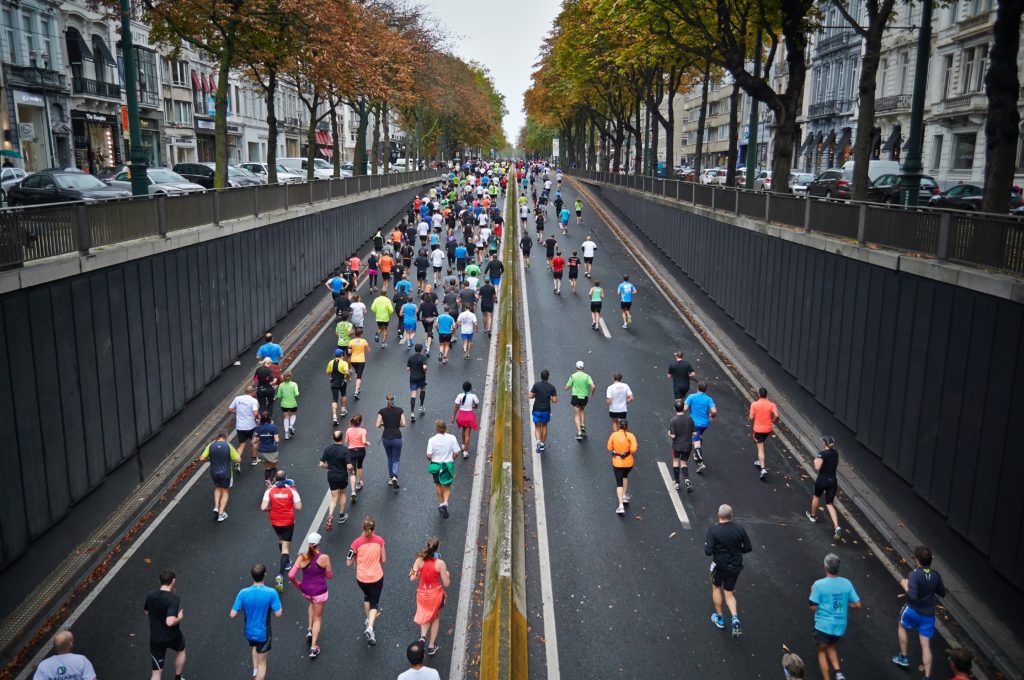
My love of running started my freshman year of college when I signed up to take squash as a PE elective. The instructor was Coach Lord. He had served as a paratrooper in World War II, and all those years later he was still solid as a rock. He had a passion for physical fitness and turned every class into running.
For squash, we ended up running all over town, each of us with a racket in hand. Once a classmate told Coach Lord that he would not be able to attend PE the following week as he was scheduled to take the medical school admissions test. Coach Lord looked at him, and with a perfectly straight face said, “Dammit son! Get your priorities straight!” I first thought Coach Lord a bit nuts but I internalized his love of running and signed up for his most challenging “Aerobics” class two years later.
Running rewards effort in a straightforward way. It has no sand traps, gutters or curve balls. If you put in the effort, you will get faster. Running is cheap and easy. Just put your shoes on and go. Running is rhythmic and relaxing. Running is a great way to visit a new city. Running keeps you humble. Running is a great way to clear your head or think through a problem. Running gives you mental toughness. Running gives you a legal high, and one you won’t have to wait in line at the pharmacy for.
I’ve never been the fastest, strongest, or even most consistent runner. There have been long stretches when I’ve stopped running altogether. But like a safe harbor, running is something that I always seem to return to. There is a history of alcoholism and depression in my family, but I have avoided these difficulties, at least partially, due to running.
A few years after moving to Austin, I met another coach who made a lasting impression on me. Coach G escaped a very difficult childhood in war-torn Africa and came to the United States as part of an Olympic training program. Whereas Coach Lord had the intensity of a drill sergeant, Coach G teaches his students to Run with Joy. His wisdom transcends running, and he is himself a personal testament to the power of hope and optimism.
Parkinson’s has revealed new lessons to me on running and on what it means to be physically active. The first came not long after my diagnosis when I was introduced to my now good friend, Bob. At that point, Bob had had Parkinson’s for about five years. I told Bob over the telephone about my recent diagnosis, about myself, and I asked him if he wanted to meet for coffee. “No, I don’t want to meet for coffee.” I was a bit startled, but Bob continued, “I want to meet for a five-mile run.” Bob knew then what I know now: the best way to encounter Parkinson’s is on your feet.
The next lesson occurred a couple years later, during the 2019 Austin half marathon. I was running a particularly difficult uphill at about mile 10. I heard a man next to me mutter under his breath, “Man, this really sucks.” I replied spontaneously, as if it bubbled up from inside me, “Hey, there will be a time when you won’t be able to do this. Enjoy it while you can.”
None of us—PD or otherwise—gets use of an able body forever. It’s a privilege that no one should ever take for granted. Thus, I hope coach G won’t mind if I amend his credo slightly to reflect this sentiment—Run with Gratitude.
* * *
A couple of weeks ago I finished a six-mile training run on one of those magical, cool, dry, clear mornings that is all too rare in Central Texas. I felt strong throughout the run and had a wave of endorphins wash over me at the end. I wiped the sweat from my brow and flashed the dumb grin I always get after runs like that. I had learned the third and most important lesson: Running gives a sense of control over Parkinson’s.
Parkinson’s is not something that simply happens to me, or to you for that matter. Realize that you can do something about your Parkinson’s. It doesn’t have to be running. Just find something. Get your priorities straight. Do it with Joy and Gratitude. Put your shoes on and go.
__________
Photo by Mārtiņš Zemlickis on Unsplash
Christopher Lion is Managing Director at The Mather Group and was diagnosed with Parkinson’s in March 2018 at the age of 54. He lives in Georgetown, Texas with his wife, Laura, and their two kids Andrew (17) and Sarah (15). He has competed in nine marathons and many other athletic events.
